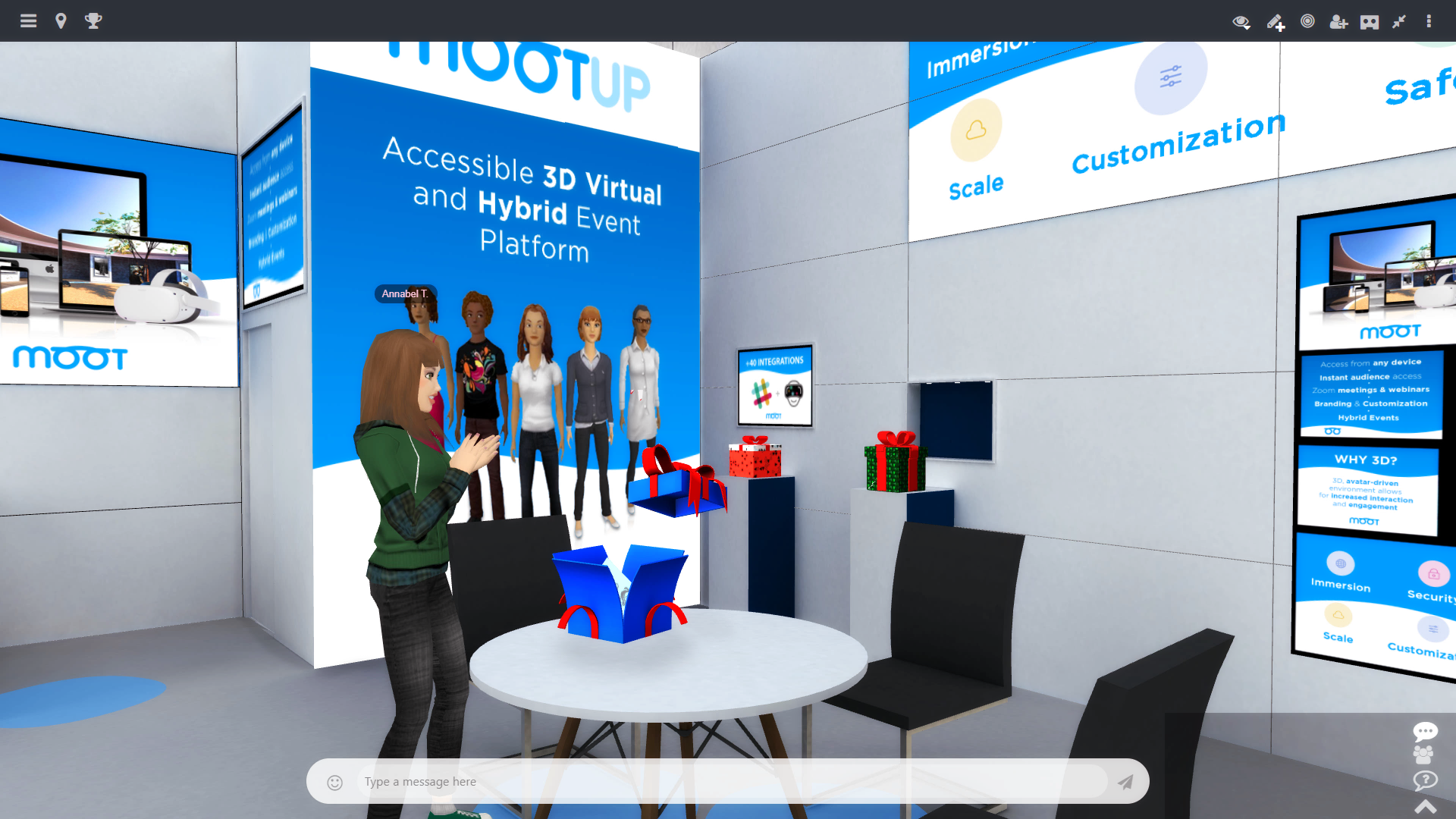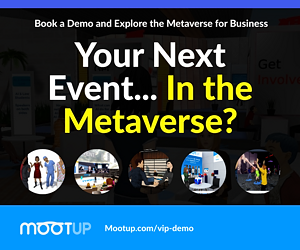Are you seeking a way to produce and host virtual or hybrid events in the metaverse? A virtual events website is an effective solution. It offers powerful event networking software, advanced security measures, and cost-effective solutions that can help maximize your ROI from hosting these events. In this blog post, we will discuss what a virtual events website is, how to create one, best hosting practices, security considerations, and tips for maximizing ROI from your investment into such technology.
Table of Contents:
- How to Create a Virtual Events Website
- Best Practices for Hosting Virtual Events on Your Website
- Security Considerations When Hosting Virtual Events on Your Website
- 5 . Tips for Maximizing ROI from Your Virtual Events Website
- FAQs about Virtual Events Website
- What features does your virtual events website offer?
- How easy is setting up and managing a virtual event on your platform?
- Does the platform support hybrid events (both in-person and online)?
- Are there any customization options for branding or customizing the look of my event page?
- Is an analytics dashboard available to track my event’s attendance, engagement, and other metrics?
- Conclusion
How to Create a Virtual Events Website
Creating a virtual events website can be a great way to increase your event industry business. With the right platform and setup, you can easily create an engaging online experience for attendees that rivals any physical event. Here’s how to get started:
Choosing the Right Platform for Your Needs:
When selecting a platform for your virtual events website, it is essential to consider what features are necessary and which are nice-to-haves. Consider scalability, user management capabilities, integrations with third-party services (such as payment processing), ease of use, and customization options. Choosing one that will allow you to quickly adapt or expand in response to changes in technology or customer needs is also essential.
Designing and Customizing Your Site:
Once you have chosen a platform, it’s time to design your site. Start by creating an attractive homepage with information about upcoming events and easy access links for registration and other related activities, such as live streaming or video conferencing tools like Zoom or Webex. You should also customize the look of the page with colors, logos, and images that reflect your brand identity while ensuring all content meets accessibility standards (WCAG 2).
Once the design of your site is complete, it’s time to set up event registration and payment processing. To ensure smooth transactions during checkout, ensure all forms include clear instructions on how participants should register and detailed descriptions of any fees associated with each event type, including taxes, if applicable. Additionally, consider incorporating captcha codes or two-factor authentication into the system for added security, depending on each transaction’s complexity. Keywords: Event Registration; Payment Processing; Captcha Codes; Two-Factor Authentication
To maximize attendance at virtual events, employ a multi-channel promotional approach that leverages social media platforms like Facebook, Twitter, and Instagram; email campaigns; search engine optimization techniques; influencer marketing strategies; and paid advertising campaigns. This will help ensure maximum visibility across different audiences who may be interested in attending the online experiences available through your service. Keywords: Multi-Channel Promotion; Social Media Platforms; Email Campaigns; Search Engine Optimization (SEO); Influencer Marketing Strategies; Paid Advertising Campaigns.
By adhering to the guidelines in this article, you can create a virtual events website that meets your requirements and captivates your attendees. Having explored the steps to create a virtual events website, let us now consider some strategies for hosting successful virtual events.
Key Takeaway: Creating a successful virtual events website requires choosing the right platform, designing and customizing your site with accessibility in mind, setting up event registration and payment processing securely, and employing an aggressive multi-channel promotional strategy to reach potential attendees. To ensure you hit the ground running, having all your ducks in a row is essential.
Best Practices for Hosting Virtual Events on Your Website
Hosting virtual events on a website is an effective way to reach and engage with your target audience. It’s essential to ensure that your content for these events is entertaining, interactive, and comes to as many people as possible. Here are some best practices for hosting successful virtual events on your website.
Creating Engaging Content:
When creating content for your virtual event, ensuring it appeals to your target audience and provides value in some way is essential. This could include offering educational materials or activities that provide entertainment or encourage participation from attendees. Utilizing interactive features like polls, quizzes, Q&A sessions, and chat boxes can help keep people engaged throughout the event.
Utilizing Interactive Features:
Incorporating interactive elements into your virtual event will help boost engagement by providing opportunities for attendees to interact with each other and participate in activities related to the topic of discussion. These features should be easy-to-use, so they don’t distract from the event’s main focus but still add value by allowing participants to ask questions or express their opinions about topics being discussed during the session.
Leveraging Social Media:
Leveraging social media platforms such as Twitter, Instagram, Facebook Live streams, etc., can help increase the visibility of your virtual events while also providing additional opportunities for interaction between attendees before and after the actual event takes place. You can also use these platforms to promote upcoming events and share information about past ones, which may entice more people to join future ones you host.
Offering incentives such as discounts on products/services associated with your business or even giveaways at random times during an event can be a great way to attract more people who may not have otherwise attended if there was no incentive involved. This helps increase attendance numbers while giving something back in return, increasing loyalty among existing customers.
Following these best practices ensures that your virtual events are secure and engaging for all participants. Security considerations must also be considered when hosting virtual events on your website to protect attendees’ data and keep malicious actors out.
Key Takeaway: Hosting virtual events on your website can be a great way to engage with your target audience. Create engaging content and utilize interactive features like polls and Q&A sessions. Leveraging social media platforms for promotion and offering incentives, such as discounts or giveaways, will help attract more people to attend.
Security Considerations When Hosting Virtual Events on Your Website
When hosting virtual events on your website, security considerations are paramount. Data protection and privacy compliance are essential for the security of all participants. Secure payment processing solutions should be utilized to safeguard confidential financial data from unauthorized access. Verifying participants’ identities through robust authentication methods should be employed to prevent malicious actors from infiltrating the event or stealing data. Monitoring network traffic for any signs of malicious activity should be undertaken to ensure the security of the event. To ensure the safety of the event, software should be regularly updated with the latest security patches to mitigate any potential vulnerabilities.

It is essential to ensure the security of your virtual events website by implementing data protection and privacy compliance, secure payment processing solutions, robust user authentication measures, monitoring network traffic for unauthorized access attempts, and keeping software up-to-date with the latest security patches. To maximize ROI from your virtual event website, consider developing strategies to retain customers and utilizing automation tools to streamline processes while leveraging analytics to track performance.
With MootUp, Integrate seamlessly with enterprise SSO authentication, bank-level data privacy, and security while satisfying governmental standards like GDPR.
Secure virtual events on your website with payment processing, user authentication, network monitoring & software updates for data protection & privacy compliance. #VirtualEvents #DataSecurityClick to Tweet
5 . Tips for Maximizing ROI from Your Virtual Events Website
When maximizing ROI from a virtual events website, there are several strategies that event industry professionals should consider. Developing strategies to retain customers is essential for any business looking to maximize profits. Utilizing automation tools can streamline processes and help save time and money. Analyzing performance metrics such as engagement, attendance, and revenue can enable businesses to make informed decisions about their operations. Offering discounts or special deals are also a great way to incentivize people to attend your events and create loyalty programs that reward repeat attendees with exclusive benefits or rewards.
Another critical component of maximizing ROI from virtual events websites is ensuring security measures are always in place. Data protection and privacy compliance must be met by implementing secure payment processing solutions and establishing robust user authentication measures such as two-factor authentication (2FA). To further protect against malicious activity, monitoring network traffic for suspicious access attempts and keeping software up-to-date with the most recent security patches is essential.
Finally, creating engaging content for your audience is essential when hosting virtual events on your website to keep them interested and engaged throughout the experience. Interactive features like polls or Q&A sessions allow you to get real-time participant feedback while leveraging social media platforms helps reach more people who may not have known about your event(s). Overall, these tips will help ensure success when hosting virtual events on a website while maximizing return on investment (ROI) over time.
Key Takeaway: Maximizing ROI from a virtual events website requires industry professionals to employ strategies such as leveraging analytics, offering discounts and special deals, establishing security measures, and creating engaging content. By utilizing these tips effectively, event hosts can ensure success while reaping the rewards of their investments.
FAQs about Virtual Events Website
What features does your virtual events website offer?
Our virtual events website offers a range of features to make producing and hosting events in the metaverse easier than ever. Our platform allows users to create custom event websites quickly, stream live video with integrated chat functionality, manage registration & ticketing processes, and track analytics. We also provide tools for content creation, such as 3D environments and avatars which can be used to create immersive experiences for attendees. Additionally, our platform is compatible with various third-party applications that allow users to extend their reach beyond the metaverse.
How easy is setting up and managing a virtual event on your platform?
Our no-code platform is designed to make setting up and managing virtual events easy for event industry professionals. Our intuitive interface allows users to build their desired event quickly, host it in the metaverse, and easily manage all aspects of their virtual or hybrid event. Our platform offers a comprehensive suite of tools to tailor the visual elements and monitor attendance metrics in real time, allowing you to ensure your virtual event runs flawlessly. With our streamlined setup process and powerful management capabilities, you can be sure your virtual events will run smoothly from start to finish.
Does the platform support hybrid events (both in-person and online)?
Yes, the platform supports hybrid events. It provides various tools to create and host virtual and in-person events. The platform allows users to design their event space with custom avatars, 3D environments, interactive activities, media streaming capabilities, registration portals, and more. With its wide array of features, the platform enables organizers to bring together a global audience without needing a physical presence.
Are there any customization options for branding or customizing the look of my event page?
Yes, there are customization options for branding and customizing the look of your event page. Our no-code platform offers extensive features to ensure you can tailor your virtual or hybrid event to suit your exact needs. You can customize colors, add logos, create custom layouts, and more without writing code. We also offer a selection of templates that provide easy ways to start designing the perfect event page quickly and easily.
Is an analytics dashboard available to track my event’s attendance, engagement, and other metrics?
Yes, our no-code platform offers an analytics dashboard to track attendance and engagement metrics from your event. Our analytics dashboard provides data insights, enabling you to assess your event’s performance and make decisions accordingly. With a few clicks, you can view critical indicators such as the number of attendees, average session duration, active users per day or hour, most popular content pieces, and more. Additionally, we provide detailed reports with graphical visualizations for easy understanding so that you can maximize the potential of your events.
Conclusion
A virtual events website can be a powerful tool to reach audiences and maximize ROI from your event. By following best practices, considering security concerns, and utilizing the right technology to host virtual events on your website, you can create an effective platform to draw in attendees. With careful planning and implementation of these tips, you can ensure your virtual events website succeeds.
MootUp’s browser-based platform is the ideal solution to “futureproof” your event tech stack. It allows viewing content on all platforms, including laptops, VR/AR headsets, tablets, and cellphones, without acquiring or running any software.
Join MootUp and discover the power of hosting virtual events in the metaverse. Create, customize, and manage your event from start to finish with our no-code platform.

